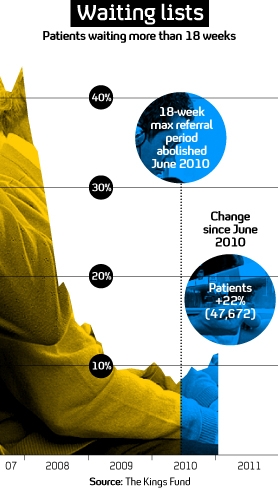NHS faces ‘perfect storm’
 Victoria Macdonald
Health and Social Care Editor
Victoria Macdonald
Health and Social Care Editor
Hospital waiting times are at a three year high and the percentage of patients waiting longer than four hours in accident and emergency rose sharply at the end of 2010, reports Victoria Macdonald.
<!–
–> <!–
–> <!–
–> <!–
–>

Unprecedented challenges
The King’s Fund reports says: “Over the next few years the NHS faces two unprecedented challenges: coping with the tightest funding settlement for decades and implementing top-to-bottom reforms of the system.”
The panel of finance directors reported that they had “limited” confidence in meeting their productivity targets over the following years. Many of the panel also reported the difficulty they were having in trying to “manage increased demand for care with reduced capacity and the need to continue to meet targets and maintain quality while keeping within reduced budgets”.
When asked how they would meet their productivity target, the majority mentioned reducing beds or services.
Today, the NHS Confederation, which represents NHS trusts and managers, said that these figures were a blip but could be a problem in the trend carried on upwards. The acting chief executive, Nigel Edwards, said that the relaxation of targets gave hospitals greater freedoms to treat patients based on clinical need but there was still a need for a mechanism to ensure patients could expect treatment to be “timely and not subject to unnecessary delay”.
Despite continued good performance, the NHS is still facing pressure from growing demand and will do so for many years to come. David Flory
David Flory, Deputy Chief Executive of the NHS, said: “The NHS had a good year last year in spite of an exceptionally cold winter. Average waiting times remain low and broadly stable; just nine weeks for admitted patients and 3.5 weeks for outpatients. People with cancer symptoms continue to see a specialist quickly, MRSA and C.difficile rates are at their lowest level since records began, and the NHS has achieved a healthy financial surplus in line with its plans. This is a great credit to NHS staff and good news for patients.”
Mr Flory added: “Despite continued good performance, the NHS is still facing pressure from growing demand and will do so for many years to come. This particular snapshot shows that the NHS must maintain its focus on waiting times and improving patient outcomes, while dealing with the extra demands on the service.”
The Department of Health claimed that The King’s Fund data did not take account of patients who declined two reasonable offers of admission, for example, to allow them to go on holiday. They said that data adjusted to take account of these “patient inititiated pauses” showed that 89.8 per cent of admitted patients started treatment within 18 weeks of referral from their GP in February.
The King’s Fund said even with those adjusted figures the trend was still up.